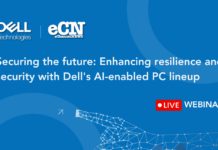To keep their servers working and online, corporations spend big dollars on expensive storage area networks (SAN). But does a SME really need a SAN for all of its storage needs? Synology America Corp. — a leading manufacturer in network attached storage (NAS) — says no.
Recently, Synology entered the SME storage market, with its RC18015xs+ — a high availability (HA) cluster solution that scales over 1PB; handles up to 2,000 users, andstarts at under $12,000. The system requires two server controllers (for built-in high availability) and one storage expansion unit for hardware redundancy. If one server or controller goes offline, the second server or controller automatically kicks in to continue operations.
Technical experts at Synology offer three ways that SMEs can reduce SAN costs and make storage management easier with the RC18015xs+.
1) Back up SAN for a Fraction of the Cost
Why should a company pay for two SAN, when they're only using one for backups? Synology challenges SMEs to save money and back up their SAN to a NAS. Traditional SANs are expensive and can initially range between $20,000 to $40,000. Another $10,000 can be added for equipment licensing fees. With more than 1 PB of raw storageand smart recycling, the RC18015xs+ makes it easy for IT admin to store and recover data.
Also, by using space-saving automation features like smart recycling; the RC18015xs+ allows IT admin to dictate how many versions of a file to keep (up to 256) and when to do it. Copies can be retained hourly, daily, or weekly. The system is ideal for archived storage.
For data consistency, the RC18015xs+'s advanced snapshot technology allows an IT admin to take a "picture" of the entire system before a backup starts. This means changes can't happen in the middle of the process, causing system inaccuracy.
2) Save on Virtual Storage and Still Get Enterprise Features
By using virtual storage a company can save money, time, space, and energy on IT. For example, in a traditional model, if an IT admin needs to add storage for 200 servers, he or she would buy 200 external storage devices and set up each server, separately. With virtual storage, the IT admin can add storage to one dedicated storage server, and then partition it for each of the 200 servers using one system. This saves time because the admin doesn't need to go to each individual machine to set up the drives. It also saves money and space. Finally, it's easier to monitor and maintain one virtual repository, than 200 separate devices.
Still, expenses for virtual storage can add up if the technology is used on an expensive SAN. With the affordable RC18015xs+, an IT admin can still get enterprise-level software features. With its lower price point, the RC18015xs+ is certified for VMware, which offers a host of solutions for virtual storage. For example – with traditional networking, a business can come to a halt when upgrading a physical server with additional storage because the admin needs to take the equipment offline to complete these tasks. Yet, if an IT admin uses the RC18015xs+ for its virtual storage capabilities; the admin can keep the physical server operational and still gain additional server storage, without any downtime.
Another benefit for VMware on the RC18015xs+ is that VMware vSphere hosts can achieve 40 to 90 percent storage performance improvement. So, instead of taking 20 to 40 minutes to conduct a single task – like cloning a server – the task can be completed in under a minute. Additionally, network bandwidth utilization is greatly reduced (up to 90 percent) for storage duties. This frees up capacity for other tasks for the VMware host. To further improve network bandwidth capacity, the RC18015xs+ supports up to two 10GbE network links, which can be set for Link Aggregation to improve aggregate performance and network redundancy.
3) Get Cost-Effective Storage for Specialized Industries and Individual Departments
To stay competitive, SMEs must keep their costs down. The RC18015xs+ offers financial flexibility because the storage can scale up to 180 drives as the organization grows – freeing up budgets, server space, and energy consumption until expansion is needed. Moreover, the equipment provides enterprise functions at an affordable price – especially for IT professionals working for specialized industries and departments.
Better Storage for Companies that Use Large Files for Video Production or Surveillance
Video production companies, advertising agencies, and security firms all know that working with large video files requires massive amounts of storage and bandwidth. Downloading, editing, and uploading multimedia files can max out servers and bottleneck network speeds. The RC18015xs+ comes with over 1.4 PB of storage and excellent processing speeds. It delivers superior performance of over 2,270 MB/s throughput and 355,400 IOPS when using dual 10GbE connections bonded with Link Aggregation. Unlike a SAN, the RC18015xs+ allows SMEs to run and store large files for applications, such as Adobe Creative Cloud, for under $12,000.
Advanced Storage Solutions for Individual Departments, and Remote Access
By moving a department's files to a NAS, IT admin can reserve their SAN for the critical computing operations needed for the SME and can still manage files for an individual department. The RC18015xs+ easily handles 2,000 connected users. It comes with the Btrfs file system – a next generation, enterprise feature. With the technology deployed, IT admin can use snapshots; set shared folder quotas, and obtain BitRot resiliency for advanced data integrity. Synology is currently developing additional Btrfs functionality to help IT admin fully optimize the emerging technology.
Also with the RC18015xs+, admin can create permissions and restrictions to manage data access. If employees need to access files remotely, the admin can use the NAS as a private cloud with QuickConnect. The technology allows remote access to the system without port forwarding. If the IT admin wants more granular control, he or she can opt for port forwarding and built-in firewall controls, instead.
The Innovative Design of the RC18015xs+ Helps Reduce the Costs for Drives by up to 50 Percent
The RC18015xs+ employs hardware redundancy. Some high availability clusters use two stacks of drives – one for data storage, and the second for redundancy – in case the first stack malfunctions. The RC18015xs+ only needs one stack of drives, because the redundancy is built-into the two server controllers – not the disks. IT admin can reduce the number of disk drives and their cost by 50 percent. Fewer total drives means less equipment to purchase, set up, and maintain. So, SMEs don't use as much energy or space to cool and operate the stacks. All of these efficiencies mean more savings for a business.
Each RC18015xs+ controller costs $3,999.99, while the expansion is $3,499.99 – making the total solution less than $12,000, to start. The system runs on Synology's award-winning DiskStation Manager OS, which makes it faster, easier, and more efficient to manage and protect data.













